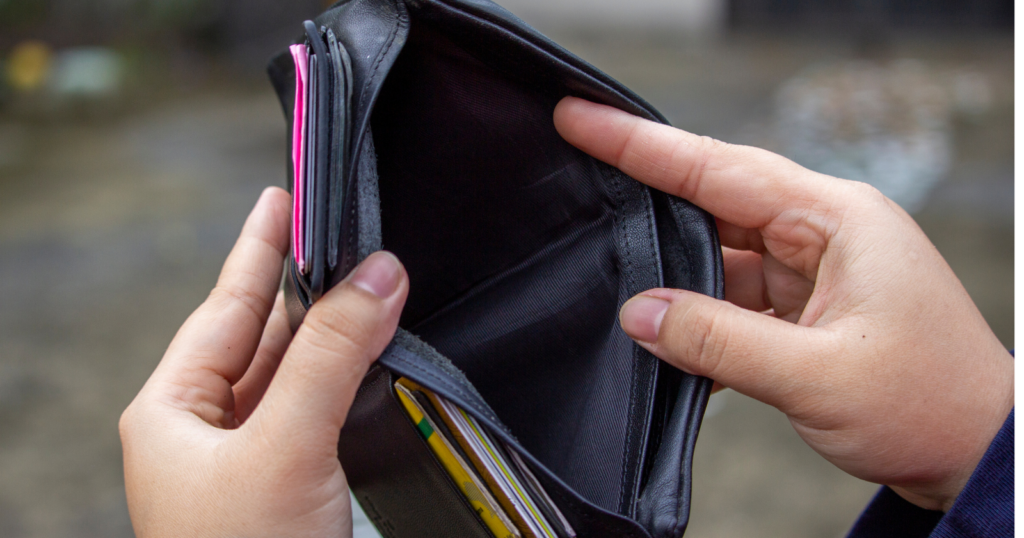On paper, they’re doing fine.
They’ve got a steady job. A decent paycheck. Maybe even a few perks and benefits to boot.
And yet—every month feels like a tight squeeze.
They’re not splurging on yachts or designer shoes. But they’re always just a little behind. Always one flat tire or dentist appointment away from panic.
If you’ve ever found yourself thinking, “I should be okay—but I’m not sure where the money’s going,” you’re not alone.
A lot of folks earn enough to get by—and still feel broke.
And it’s not always about income. It’s about the quiet habits that quietly drain your wallet over time. The ones that don’t seem like a big deal… until they start stacking up.
Here are a few of those habits I’ve seen—some I’ve lived through myself—that might explain why someone with a decent paycheck still feels like they’re constantly playing catch-up.
1. They avoid checking their account balance
It sounds small, but this one’s huge.
People who feel perpetually behind financially often avoid looking at their money altogether. They don’t track spending. They don’t check their statements. They just swipe the card and hope for the best.
I’ve been there. In my thirties, there was a stretch where I dreaded opening my bank app. I figured what I didn’t see couldn’t stress me out.
Of course, it did stress me out—because avoiding it didn’t stop the problem. It just delayed the reality.
Staying informed is the first step to staying in control.
2. They rely on small “feel-good” purchases to break up the week
A coffee here. A takeout order there. A few online “treat yourself” items during a rough day.
Individually? Not a big deal.
But over time, these impulse buys add up. And the people who make them aren’t reckless—they’re just trying to inject a little comfort into an otherwise exhausting week.
The problem is, those comfort purchases often eat into the budget more than we realize. They’re sneaky. And they never really fix the root issue.
3. They say “yes” to everything without budgeting for it
When someone asks them to go out for dinner, join a birthday trip, or split a group gift—they rarely say no.
They don’t want to seem cheap. Or difficult. Or like they’re struggling (even when they are).
So they say yes. Again and again.
And the pressure to “keep up” slowly chips away at their cash, until they’re left wondering why they can’t seem to save—even though they’re not living extravagantly.
4. They treat savings like a leftover, not a priority
I once heard someone say, “Saving what’s left at the end of the month is like trying to bake a cake with leftover ingredients.”
It stuck with me.
A lot of people who earn decent money still struggle because they wait to save until the end of the month—after all the bills, the outings, the unexpected expenses.
But the ones who stay ahead tend to save first, even if it’s a small amount. They treat it like a non-negotiable. Like rent or electricity.
If savings is always optional, it usually never happens.
5. They finance things they can’t actually afford
Monthly payments make big purchases feel manageable. That furniture set, that new phone, that gym membership—it all seems affordable when it’s “only” $39.99/month.
But over time, those little monthly payments start to add up. And pretty soon, a big chunk of your income is tied up in stuff that’s already losing value.
People who always feel short of cash often don’t realize how much of their paycheck is already spoken for before it even lands.
6. They don’t keep a basic emergency fund
Life is full of surprises—and most of them aren’t cheap.
The folks who constantly feel behind often haven’t built a small buffer for the unexpected. So when a surprise pops up, they have to pull from money that was meant for something else.
A medical bill. A car repair. A friend’s wedding across the country.
Without a little cushion, every curveball becomes a crisis. And that stress takes a toll—not just financially, but emotionally.
7. They upgrade “just a little” too often
I had a coworker years ago—Darren—who got a raise and decided to upgrade his apartment. Then his car. Then his wardrobe.
None of it was flashy. Nothing outrageous.
But six months later, he was still living paycheck to paycheck—just with nicer furniture.
That’s called lifestyle creep. When your income increases, but so does your spending. Bit by bit. Quietly.
You still feel stuck. Only now, it’s in a nicer trap.
8. They depend too heavily on credit cards to “float” them
Credit cards can be helpful—when used wisely. But for people who are always just a bit behind, they often become a crutch.
A way to bridge the gap between what they want to afford and what they can.
At first, it seems manageable. But those balances grow fast. And once interest kicks in, it becomes a treadmill that’s hard to step off of.
It’s not that they’re irresponsible. It’s that they’re patching holes instead of fixing the leak.
9. They don’t talk about money—at all
Whether it’s embarrassment, upbringing, or just old-fashioned pride, a lot of people struggling financially don’t talk about it. Not with partners. Not with friends. Sometimes not even with themselves.
They keep it hidden. Quiet. Off the radar.
But silence doesn’t solve anything. In fact, it usually makes the situation worse—because they can’t plan around a problem they haven’t defined.
Honest conversations—especially with yourself—are where financial clarity begins.
10. They underestimate how much stress money is actually causing
I once sat down with an old friend who looked exhausted. He’d just paid off a big credit card bill and was finally breathing a little easier.
He said, “I didn’t realize how heavy that stress was until it was gone.”
That’s the thing. People who live close to the edge financially—even with decent incomes—often carry a low-level tension all the time. It affects their sleep, their health, their relationships.
And because they’ve adapted to it, they think it’s normal.
It’s not. And the difference between surviving and thriving financially often comes down to recognizing just how much peace of mind is worth.
A final thought
You can earn a good living and still feel broke if your habits don’t support your income.
And fixing it doesn’t require a lottery ticket or a second job—it starts with awareness. Small shifts. Paying attention.
Money doesn’t have to be complicated. But it does have to be intentional.
So if you see yourself in any of these habits, don’t beat yourself up.
Just start where you are. Make one change. Then another.
Because the real measure of success isn’t how much you make—it’s how free you feel.







